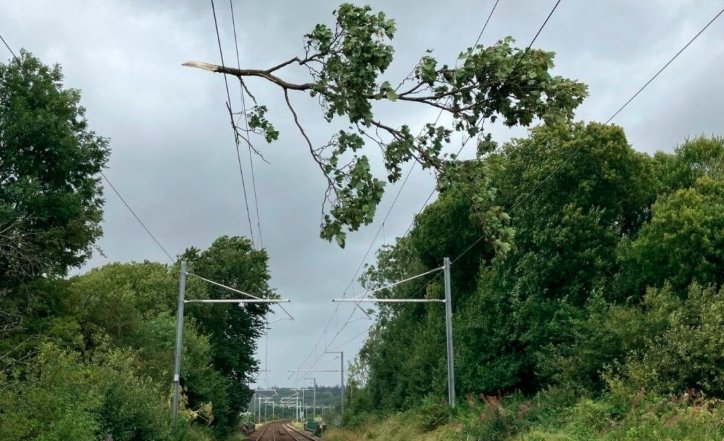“The Most Damaging Summer Storm in Recent Memory”
In the wake of Storm Floris, tens of thousands across Scotland are still without electricity, stranded by blocked roads and suspended trains. The storm, which barrelled through the country on Monday with wind gusts reaching up to 90 mph, is now being called the worst summer storm in years by Scottish and Southern Electricity Networks (SSEN).
More than 50,000 homes lost power at the height of the storm. While many were reconnected overnight, thousands remain in the dark across the Highlands, Moray, and Aberdeenshire.
“This was the most damaging summer storm in recent memory,” SSEN said in a statement Tuesday, adding that emergency repair crews have been deployed across the worst-hit areas.
Rail Chaos and Uprooted Routes
Network Rail Scotland reported 119 incidents on train lines during the storm, including trees downed on tracks, debris on lines, and damage to overhead cables. Commuters and travelers across the country faced widespread cancellations, especially on routes through the Highlands, Stirling, and the northwest coast.
“Teams have been working tirelessly,” said a spokesperson for Network Rail. “But some lines will remain closed through Wednesday.”
One dramatic image shared by Network Rail showed a splintered tree dangling precariously over power lines in Cornton near Stirling—a visual summary of the storm’s reach.

Flights Grounded and Roads Blocked
Scotland wasn’t the only region hit. Flights across the UK also suffered significant disruption.
According to aviation data firm Cirium:
-
At least 68 departure flights were cancelled nationwide on Monday.
-
Wind shear and poor visibility prompted delays at major hubs including Edinburgh and Glasgow.
Road travel was no easier. In Onich near Fort William, workers in high-vis jackets spent hours removing massive trees that had collapsed onto the A82—a crucial trunk road into the Highlands.
Aberdeenshire: Divided Response
In Aberdeenshire, residents had mixed experiences. Some took to social media to praise utility teams for their rapid response—even in isolated areas. Others voiced frustration over persistent delays in rural reconnections, a recurring complaint in Scotland’s sparsely populated regions.
“It’s the middle of August, and we’re lighting candles and boiling water on camp stoves,” said Fiona McIntyre, a teacher in Ballater. “This doesn’t feel like summer anymore.”
When Summer Storms Stop Feeling Rare
Storm Floris isn’t just a blip, say experts. Climate researchers are pointing to a concerning rise in destructive summer storms over the past five years.
| Summer Storms in Scotland (2020–2025) | Estimated Peak Wind Speed (mph) | Major Impacts |
|---|---|---|
| Storm Callum (2020) | 65 | Local flooding, tree damage |
| Storm Elodie (2021) | 72 | Rail suspensions, minor outages |
| Storm Idris (2023) | 84 | Widespread power cuts, infrastructure loss |
| Storm Floris (2025) | 90+ | Rail + air disruption, 50,000+ without power |
Meteorologists say warming sea surface temperatures and shifting jet streams are contributing to the pattern. The seasonal line between summer and autumn is becoming increasingly blurred.
Councils Demand More Resilience Measures
With clean-up efforts still underway, local councils are already pushing for funding boosts to prepare for future extreme weather. Priorities include:
-
Tree trimming near critical power lines
-
Investment in road-clearing vehicles
-
Upgrades to regional alert systems
-
Infrastructure audits in vulnerable rural zones
“There’s a growing recognition that this isn’t just bad luck,” said one Highland council member. “It’s a systems problem—and we need to get ahead of it.”
Midweek Warning: Another Front Incoming
The Met Office isn’t offering much relief. Forecasters have issued a fresh warning for wet and windy conditions starting late Wednesday into Thursday, especially for north-western regions.
Transport Scotland is urging caution for those planning travel midweek.
Tips for Safe Travel This Week
(shared by Transport Scotland):
-
Check live travel updates before setting out
-
Keep emergency supplies in your vehicle
-
Avoid unnecessary journeys during active warnings
-
Don’t attempt to drive through standing water
Despite the chaos, officials confirmed no injuries or fatalities tied to Storm Floris—a notable silver lining in what’s otherwise been a bruising start to August.
“It’s Going to Take a While”
With the weather easing—temporarily—utility teams and transport authorities are shifting their focus to recovery. But between rebuilding rail lines, restoring power, and unblocking roads, the clean-up will stretch into the weekend at least.
As Fiona McIntyre in Ballater put it:
“We’ve had snow days, but never storm days in August. If this is the new normal, we’re not ready.”


















